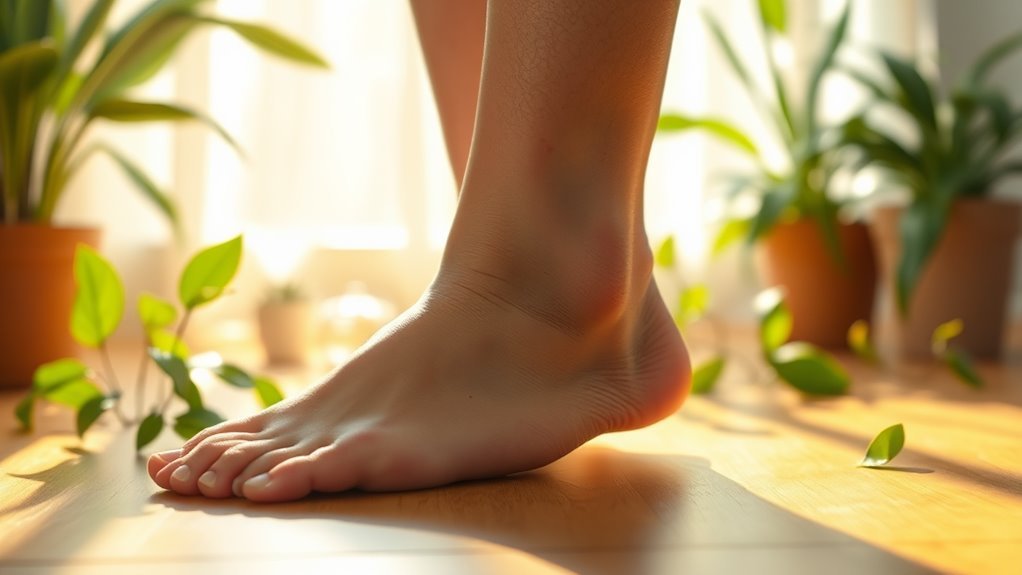11 Spiritual Meanings of Plantar Fasciitis
As we explore the topic of plantar fasciitis, it's intriguing to contemplate how this common physical ailment might reflect deeper spiritual meanings. We often overlook the emotional burdens and life imbalances that can manifest as foot pain. By examining these connections, we may uncover insights about our self-worth and resistance to change. What if our discomfort is urging us to seek stability and embrace personal growth? Let's uncover the layers of significance that this condition holds and see what it might reveal about our spiritual journey.
Key Takeaways
- Plantar fasciitis may symbolize unresolved emotional burdens, urging individuals to confront and release hidden stress or anxiety.
- The condition can reflect feelings of unsupportedness, highlighting the need for strong connections with friends and family for emotional resilience.
- Resistance to change often manifests physically, with plantar fasciitis serving as a prompt for personal growth and spiritual awakening.
- Insecurity and self-worth issues may arise, encouraging self-reflection and the practice of daily affirmations to reinforce positivity and grounding.
- Holistic healing approaches, such as meditation and mindfulness, can address both physical discomfort and emotional well-being, fostering overall balance.
Emotional Burdens and Foot Pain
Plantar fasciitis often serves as a physical manifestation of deeper emotional burdens we carry. We might notice that the tightness in our feet parallels the pressure we feel in our lives. As we navigate our day-to-day experiences, the discomfort in our soles can remind us of unresolved feelings, stress, or anxiety that we've tucked away.
Acknowledging this connection can be the first step toward personal healing. We need to create space for emotional release, allowing ourselves to confront and process the emotions tied to our physical pain. It's through this understanding that we begin to peel back the layers, revealing the root causes of our discomfort.
When we share our stories and feelings, we foster a sense of belonging, reminding ourselves that we're not alone in this journey. Many of us have walked the same path, feeling the weight of our burdens in our bodies.
Feeling Unsupported in Life
As we explore the emotional landscape of our lives, feelings of being unsupported can often surface alongside our physical discomfort. It's not uncommon for us to feel alone in our struggles, especially when life's challenges become overwhelming.
These feelings might manifest as plantar fasciitis, a physical reminder that we're carrying emotional burdens. In these moments, we need to recognize the importance of our support systems.
Whether friends, family, or community, these connections can anchor us when we feel adrift. Let's remind ourselves that we're not meant to navigate life's complexities alone. By fostering these relationships, we cultivate emotional resilience that helps us stand firm against adversity.
We can also take small steps to seek out new sources of support. Joining a group that resonates with our experiences or simply reaching out to someone we trust can create a ripple effect of connection and understanding.
In doing so, we affirm our worthiness of love and support. Let's embrace the idea that feeling unsupported isn't a permanent state, but a signal urging us to reach out and strengthen our bonds, reminding us that we truly belong in this shared journey of life.
Resistance to Change
Change often feels like an unwelcome guest in our lives, stirring up discomfort and resistance within us. We might find ourselves grappling with change resistance, clinging to the familiar even when it no longer serves us. This struggle can manifest physically, like in plantar fasciitis, reminding us that our bodies often reflect our emotional states.
As we navigate personal growth, it's crucial to acknowledge that resistance isn't inherently negative. It can arise from a deep-seated need for security or a fear of the unknown. By recognizing these feelings, we create space for compassion towards ourselves and others.
We're all in this together, learning to embrace change as a natural part of our journey.
Let's remind ourselves that every step we take—no matter how small—can lead to transformation. Each moment of discomfort can be an invitation to explore new possibilities, to release what no longer contributes to our well-being.
We can choose to lean into these feelings, fostering a sense of belonging as we connect with our true selves. Together, we can turn our resistance into resilience, paving the way for personal growth and a brighter future.
Insecurity and Self-Worth
Insecurity often creeps into our lives, casting shadows over our self-worth and making us question our value. We all experience moments where we feel less than enough, but together, we can reclaim our sense of self through self-acceptance practices.
By embracing our imperfections and acknowledging our strengths, we empower ourselves to rise above these insecurities.
Here are three ways to nurture our self-worth:
- Daily Affirmations: Let's remind ourselves daily that we're worthy of love and respect. Simple statements can create profound changes in our mindset.
- Mindful Reflection: Taking time to reflect on our achievements, no matter how small, helps us recognize our unique contributions to the world.
- Community Connection: Surrounding ourselves with supportive individuals fosters a sense of belonging, reinforcing the understanding that we're not alone in our struggles.
Connection to Grounding Energy
When we experience plantar fasciitis, it often serves as a reminder of our need to reconnect with grounding energy. This condition can signal that we've strayed from our natural rhythms, urging us to embrace grounding techniques that help us feel more centered and aligned. Our feet are our foundation; they connect us to the earth and anchor our energy.
By nurturing this connection, we can foster greater energy alignment within ourselves. Simple practices, like walking barefoot on grass or incorporating mindful breathing into our daily routine, can ground us and restore balance.
Taking the time to sit quietly and visualize roots extending from our feet into the earth can also deepen this connection.
In moments of discomfort, let's remind ourselves that our bodies are communicating a profound need for stability and presence. Embracing these insights not only supports our physical healing but also strengthens our emotional resilience.
We can find belonging in this shared journey of reconnecting with our grounding energy, recognizing that we're not alone in our struggles. Together, we can cultivate a deeper sense of peace and liveliness, enriching our lives and the lives of those around us.
Fear of Moving Forward
As we reconnect with grounding energy, we might also confront our fears surrounding movement and progress in our lives.
It's natural to feel apprehensive about taking the next steps, especially when fear-based decisions creep in. These fears can create inertia, holding us back from reaching our true potential.
Together, let's explore how we can overcome these barriers:
- Acknowledge Our Fears: Recognizing what we're afraid of is the first step. Are we worried about failure, judgment, or the unknown? By naming these fears, we can begin to diminish their power.
- Embrace Small Steps: Instead of overwhelming ourselves, let's focus on taking small, manageable actions. Each tiny step we take can build our confidence and momentum, propelling us forward.
- Seek Support: We don't have to navigate this journey alone. Reaching out to friends or mentors can provide us with the encouragement and perspective we need to push through our fears.
Need for Self-Care
Self-care isn't just a luxury; it's an essential practice for our overall well-being and personal growth. When we face challenges like plantar fasciitis, it's a reminder that we need to prioritize ourselves. Embracing self-love practices helps us cultivate a nurturing relationship with our bodies and minds.
Together, we can create routines that reflect our needs and desires, allowing us to heal and thrive.
Let's explore what self-care looks like for us. It might mean dedicating time to rest and recharge, or perhaps engaging in gentle stretches to alleviate discomfort. We can also foster our emotional health by surrounding ourselves with supportive individuals who encourage our journey.
By integrating nurturing routines into our daily lives, we not only honor our physical needs but also nurture our spirit.
As we practice self-care, we remind ourselves that we're worthy of love, compassion, and understanding. It's about creating space for ourselves in a world that often demands so much.
Together, let's commit to these practices, knowing that every small step we take toward self-care is a step toward deeper healing and fulfillment. We belong to this journey, and we're in it together.
Imbalance in Life Path
Neglecting our well-being can lead to imbalances in various areas of our lives, often manifesting as physical ailments like plantar fasciitis.
When we experience this discomfort, it's a gentle nudge from our bodies, urging us to reflect on our life alignment. Together, we can explore how our paths may be misaligned and recognize the significance of personal reflection.
Here are three areas to take into account:
1. Emotional Well-being: Are we allowing stress and negative emotions to overshadow our happiness?
Let's check in with ourselves regularly.
2. Work-Life Balance: Are we dedicating too much time to work at the expense of our personal lives and relationships?
Finding harmony here is essential.
3. Values and Priorities: Are we living in accordance with our true values?
Let's take time to evaluate what truly matters to us.
Spiritual Growth and Healing
Addressing our spiritual growth and healing can illuminate the deeper messages behind physical discomfort like plantar fasciitis. When we experience pain, it often serves as a call for a spiritual awakening. This discomfort invites us to pause, reflect, and reconnect with our innermost selves. It encourages us to explore what aspects of our lives may be misaligned or in need of attention.
As we initiate this journey together, we can embrace holistic healing practices that nurture both our body and spirit. Activities like meditation, gentle yoga, or nature walks allow us to cultivate awareness and foster a deeper connection with ourselves. These practices help us release tension and become more attuned to the messages our bodies communicate.
Let's remember that healing isn't a linear path; it's a shared experience that requires compassion and patience. By acknowledging our feelings and honoring our struggles, we can create a supportive environment for spiritual growth.
Together, we can transform our physical challenges into opportunities for deeper understanding and connection, ultimately leading us toward a more fulfilling and harmonious life.
Manifestation of Stress
Stress often manifests in our bodies in ways we mightn't immediately recognize, and plantar fasciitis can be one of those silent signals.
When we experience emotional turmoil or overwhelming stress, our bodies sometimes respond with physical pain, reminding us that we need to listen to ourselves more closely.
To cultivate stress relief and promote emotional release, let's consider some essential practices:
- Mindful Movement: Engaging in gentle activities like yoga or stretching can help release tension stored in our feet and throughout our bodies.
- Breath Awareness: Taking a few moments each day to focus on deep, intentional breathing can ground us, allowing us to connect with our emotions and alleviate some stress.
- Journaling: Writing down our thoughts and feelings can be a powerful tool for emotional release, helping us process what we're experiencing.
Seeking Stability and Security
When our bodies respond to emotional turmoil with physical pain, like plantar fasciitis, it can highlight our need for stability and security in our lives. We often realize that this discomfort isn't just about our feet; it reflects deeper feelings of imbalance and uncertainty.
A stability mindset becomes essential as we navigate life's challenges. We need to create a foundation that allows us to feel grounded and supported.
To cultivate this sense of stability, we might explore security practices that resonate with us. This could mean establishing routines that provide comfort, connecting with loved ones who uplift us, or even engaging in mindfulness practices that anchor us in the present moment.
We can share our experiences with each other, fostering a sense of belonging that reassures us we're not alone in our struggles.
Frequently Asked Questions
How Can Meditation Help Alleviate Plantar Fasciitis Symptoms?
We can use meditation by incorporating mindful movement and visualization techniques to connect with our bodies. This practice helps us release tension, fostering healing and relief from discomfort, while nurturing a sense of community and support.
Are There Specific Affirmations for Healing Foot Pain?
We can embrace healing affirmations like "Our feet are strong and pain-free" to nurture our journey together. By repeating these affirmations, we foster a compassionate space for healing foot pain and supporting each other's wellness.
Can Crystals Aid in the Healing of Plantar Fasciitis?
We believe crystal energy can support our healing journey. By harnessing the healing properties of specific crystals, we can create a nurturing environment that promotes comfort and well-being, fostering a sense of belonging in our healing process.
What Role Does Diet Play in Foot Health and Spiritual Well-Being?
We believe our dietary choices considerably impact both foot health and spiritual well-being. Embracing holistic nutrition nourishes our bodies and souls, fostering a sense of connection and balance that uplifts us all on our journeys together.
How Can Journaling Support Emotional Healing Related to Foot Pain?
We've found that journaling prompts can guide us in expressing our pain and experiences, fostering emotional release. By sharing our thoughts on paper, we create a safe space for healing and connection with ourselves and others.

Liza Stockholm is an esteemed spiritual guide and the visionary behind Spiritual with Liza. With a profound passion for empowering others on their spiritual journey, Liza offers a blend of educational content and personal guidance. Her expertise in spirituality is rooted in years of dedicated practice and study, making her a trusted companion for those seeking enlightenment and inner peace.






